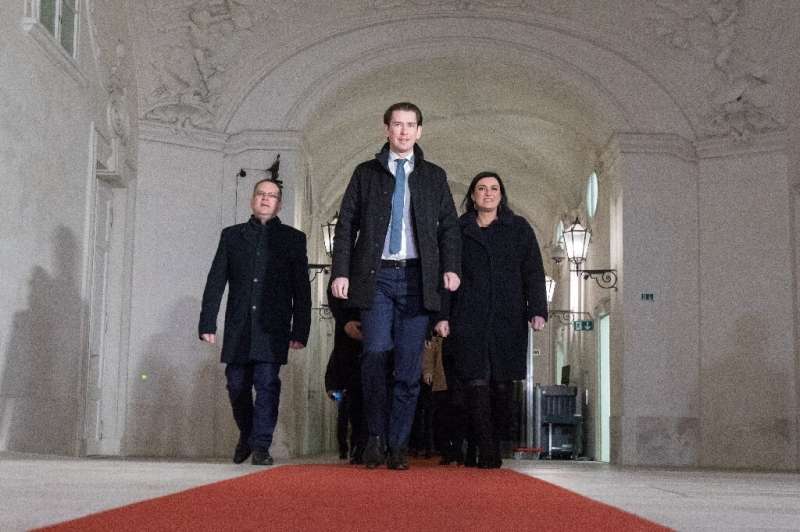Coalition 'gambles' on making Austria carbon neutral by 2040

Austrias's first coalition between conservatives and Greens announced it would aim for carbon neutrality by 2040 as it laid out a plan Thursday for the country to be a European "forerunner" to protect the climate.
The two parties have agreed to govern in what Greens leader Werner Kogler called a "gamble" after key election gains in September.
Their alliance means People's Party (OeVP) leader Sebastian Kurz, 33, returns as chancellor after his previous coalition with the far right broke apart earlier this year owing to a corruption scandal.
It marks the first time the Greens enter government on a national level in the Alpine country though they will be junior partners of the conservatives, with Kurz holding on to his fight against illegal immigration.
The carbon neutrality goal is ahead of Europe's 2050 ambition.
"It's worth the gamble" to work with the disparate conservatives, Kogler told reporters when presenting the government programme.
The 300-page programme also highlights security needs, the OeVP's main campaign platform.
"The fight against illegal immigration stays at the heart of my politics," said Kurz, who has styled himself as a tough anti-immigration fighter, reiterating the parties had "succeeded in uniting the best of both worlds".
'Daring experiment'
"Historic accord fixed" ran the Kurier daily's main headline Thursday, while a column in the left-leaning Standard described the coalition as a "daring experiment" and a "political adventure".
Papers said the pact bore the conservatives' stamp, with tabloid Oesterreich billing the OeVP as "powerful as never before".
Kurz announced his party would have 10 ministers, including those of the interior, foreign, defence and finance.
The Greens will head an enlarged environment ministry, as well as hold the justice, social affairs and sports and culture portfolios with Kogler, 58, nominated as Kurz's vice-chancellor.
Observers say Germany and others may follow suit for the unlikely marriage of conservatives and ecologists as parties seek to cater to voters' increasingly populist sentiments as well as worries about climate change.
In Austria's September polls, the environment replaced immigration as voters' top concern, giving the Greens their best-ever result with 13.9 percent.
The OeVP got 37.5 percent as disappointed voters of the scandal-tainted far-right Freedom Party (FPOe) flocked to Kurz's party.
It will now be up to the Greens' almost 280 delegates to give the final go-ahead to the agreement at a party congress on Saturday. The new government is then expected to be sworn in next week.
The programme spells out that all energy should come from renewable resources by 2030 and more to be invested in public transport.
Though about a fourth of Austria's agricultural land is used for organic produce and renewable energies account for about a third of its consumption—almost double the EU average—the nation of 8.8 million people has been among a handful of EU members that have seen their greenhouse gas emissions continue to increase between 1990 and 2017.
Tough act
Regarding immigration and security, the coalition wants to introduce preventive detention and extend the headscarf ban for school girls—clauses which will be hard to swallow for some Greens.
Kurz has created an integration portfolio led by the OeVP with an expert who has already worked on the ban on face-covering burqa or niqab veils that was introduced in 2017.
The two parties have also vowed to increase transparency, including guaranteeing freedom of information.
Standard daily columnist Eric Frey wrote Kurz and Kogler would need a "skillfulness as few politicians before them" should tricky issues arise, such as a surge in the number of asylum seekers, worsening climate change or an economic downturn.
Opposition leaders have already criticised the new coalition, with the Social Democrats (SPOe) questioning its commitment to workers, while the FPOe warned of a loosening of anti-immigration policies.
But both the SPOe and the FPOe are weakened, with the Social Democrats suffering their worst-ever results and the far right tumbling after the "Ibiza-gate" graft scandal brought down their then-leader and vice-chancellor in May, causing the government to collapse.
© 2020 AFP




















